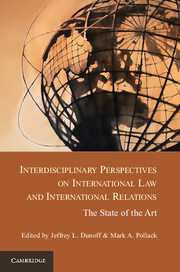 Interdisciplinary Perspectives on International Law and International Relations
Interdisciplinary Perspectives on International Law and International Relations Book contents
- Frontmatter
- Contents
- Contributors
- Acknowledgments
- Part I Introduction: Setting the Stage
- Part II Theorizing International Law
- Part III Making International Law
- Part IV The Interpretation and Application of International Law
- Part V Enforcement, Compliance, and Effectiveness
- 19 The Engines of Compliance
- 20 Coercive Enforcement of International Law
- 21 Reputation in International Relations and International Law Theory
- 22 Open Economy Law
- 23 Persuading to Comply
- 24 Against Compliance
- Conclusions
- Index
- References
24 - Against Compliance
Published online by Cambridge University Press: 05 January 2013
- Frontmatter
- Contents
- Contributors
- Acknowledgments
- Part I Introduction: Setting the Stage
- Part II Theorizing International Law
- Part III Making International Law
- Part IV The Interpretation and Application of International Law
- Part V Enforcement, Compliance, and Effectiveness
- 19 The Engines of Compliance
- 20 Coercive Enforcement of International Law
- 21 Reputation in International Relations and International Law Theory
- 22 Open Economy Law
- 23 Persuading to Comply
- 24 Against Compliance
- Conclusions
- Index
- References
Summary
International institutions and organizations influence state behavior and policy. However, the nature of this influence, its extent, and the conditions under which it is most evident are not fully specified and are the subject of much empirical research. One challenge in this empirical exploration has been identifying appropriate outcome variables with which to measure institutional effects. As I argue below, much of the literature, in both political science and international legal studies, has settled on compliance as a dependent variable. The concept of compliance may have certain advantages, such as the relatively systematic and accessible collection of data on patterns of compliance.
However, compliance is a legal concept that is unusually ill-suited to the central social-scientific pursuit: the identification and measurement of causal effects. Identification of the causal effect of an institution requires asking a counterfactual: how would state behavior have varied in the absence of the institution? In most instances, asking about compliance provides no leverage on this question. Compliance is a concept of obvious and inherent interest to lawyers and legal scholars, whose normative focus involves enhancing degrees of compliance. As such, data on compliance are abundantly available. However, political scientists using such data as a proxy for institutional effects make errors of both omission and commission – mistakenly attributing state behavior to institutional participation, and underestimating the influence of institutions on states that are not “in compliance.” This is a dilemma that cannot be addressed by more careful treatment of compliance; it can only be addressed by dropping compliance as a central concept in the study of institutional effects.
- Type
- Chapter
- Information
- Interdisciplinary Perspectives on International Law and International RelationsThe State of the Art, pp. 591 - 610Publisher: Cambridge University PressPrint publication year: 2012
References
- 10
- Cited by


